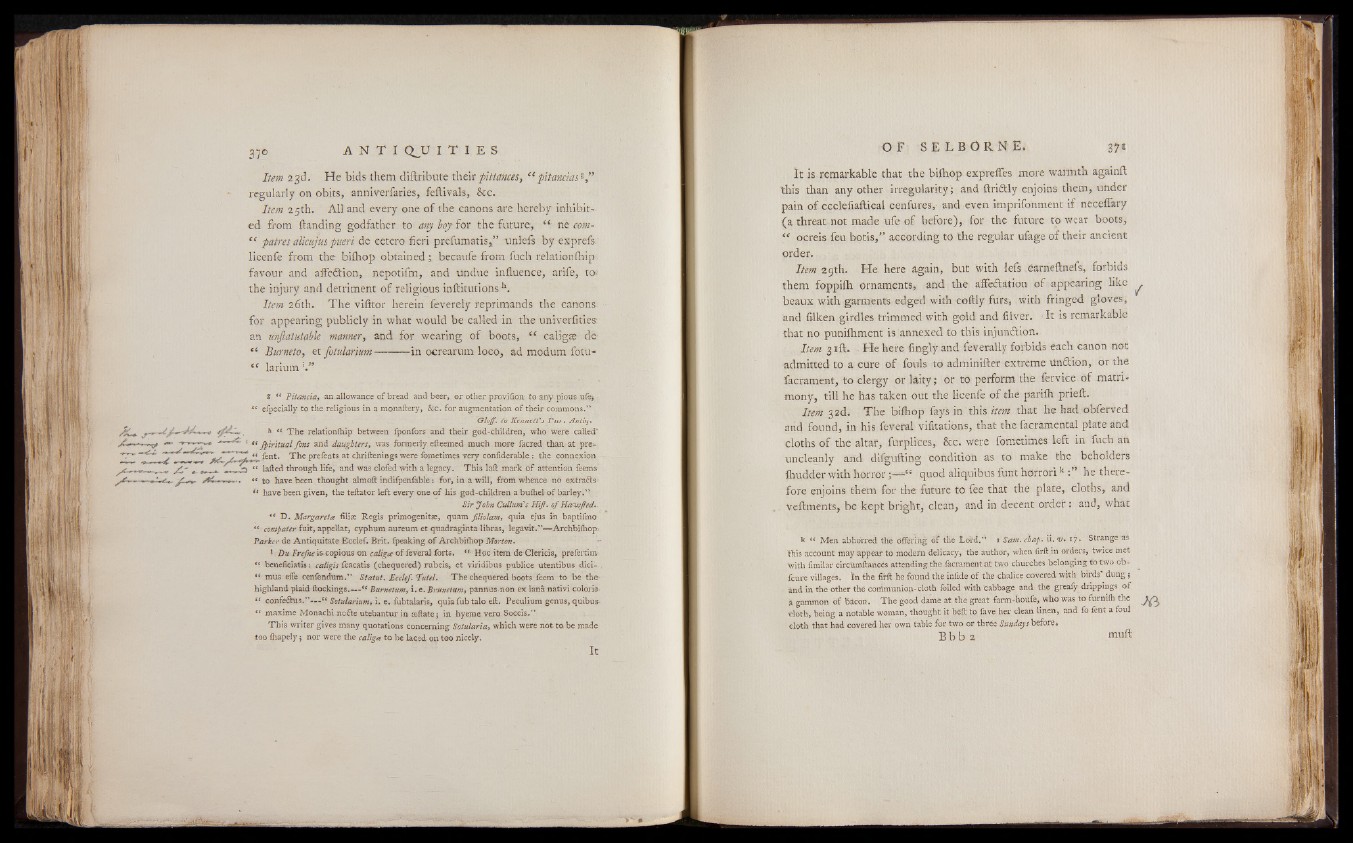
Item 23d. He bids them diftribu-te theit pittances, “ pitancias*,”
regularly on obits, anniverfaries, feftivals, &c.
Item 25th. All and every one of the canons are hereby inhibited
from Handing godfather to any boy for the future, “ n e» » -
“ patres alicujus pueri de eetero fieri prefumatis,” un'lefs by exprefs.
licenfe from the bilhop obtained; becaufe from fuch relationfhip
favour and affe&ion, nepotifm, and undue influence, arife, to
the injury and detriment of religious inftitutions h.
Item 26th. The vifitor herein feverely reprimands the canons
for appearing publicly in what would be called in the univerfities.
an unftatutable manner, and for wearing of boots, “ caligte de-
“ Burneto, et fotularium-------- in ocrearum loco, ad modum fotu-
“ lariutn
S’ te Pitancia, an allowance o f bread and beer, or other provifion: to any pious ule,
“ efpecially to the religious in a monaftery, &c. for augmentation o f their commons.”
Glojf. fo Kennetfs Par. Antiq.
h <( T h e relationfhip between fponfors and their god-children, who were called*
te fpiritual fans and daughters, was formerly efteemed much more facred than at present.
T h e prefents at chriftenings were fometimes very confiderable : the connexion
“ lafted through life, and was clofed w ith a legacy. This laft mark o f attention feems
« to have been thought almoft indifpenfable: for, in a will, from whence no extracts-
tc have been given, the teftator left every one o f his god-children a bufhel o f barley.”
Sir John Ctdluni s Hiß. o f Hwvjßed..
ee D . Margareta filise Regis primogenitae, quam filiolam, quia ejus in baptifmo
u comp at er fuit, appellat, cyphum aureum et quadraginta libras, legavit.” — Archbifhop
Parker de Antiquitate Ecclef. Brit, fpeaking o f Archbifhop Morton.
1 Du Frefne is copious on caliga o f feveral forts. f< Hoc item de Clericis, prefertim-
t( beneficiatis: caligis fcacatis (chequered) rubeia, et viridibus publice utentibus dici- .
“ mus efle cenfendum.” Statut. Ecclef. T’utel. T h e chequered boots feem to be the-
highland plaid ftockings.— “ Burnetum, i. e. Brunetum, pannus non ex lana nativi colons-
“ confe6hjs.” — “ Sotularium, i. e. fubtalaris, quia fub talo eft. Peculium genus, quibus-
“ maxime Monachi node utebantur in seftate; in hyeme vero Soccis.”
T h is writer gives many quotations concerning Sotularia, which were not to be made
too fhapely j nor were the caliga to be laced on too nicely.
It is remarkable that the bifliop exprefles more warmth againft
this than any other irregularity; and ftriftly enjoins them, under
pain of ecclefiaftical cenfures,- and even imprifonment if necefiary
(a threat not made ufe of before), for the future to wear boots,
“ ocreis feu botis,” according to the regular ufage of their ancient
order-
Item 29th. He here again, but with lefs earneftnefs, forbids
them foppilh ornaments, and the affectation of appearing like
beaux with garments edged with coltly furs, with fringed gloves,
and filken girdles trimmed with gold and filvër. It is remarkable
that no punilhment is annexed to this injunftion.
Item 31ft- He here fingly and feverally forbids each canon not
admitted to a cure of fouls to adminifter extreme Unftion, or the
facrament, to clergy or laity ; or to perform the fervice of matrimony,
till he has taken out the licenfe of the parilh prieft.
Item 3 2d, The bifliop fays in this item that he had obferved
and found, in his feveral vifitations, that the facramental plate and
cloths of the altar, furplices, &c. were fometimes left in fuch an
uncleanly and dilgufting condition as to make the beholders
Ihuddèr with horror quod aliquibus funt hörrorik he therefore
enjoins them for the future to fee that the plate, cloths, and
Veftments, be kept bright, clean, and in decent order: and, what
k u Men abhorred the offering o f the Lord.” l Sam. chap. ii.«!/. 17. Strange as
this account may appear to modern delicacy, the author, when firft in orders, twice met
With fimilar circumftances attending the facrament at two churches belonging to two cb-
fcure villages-. In the fifft he found the infide o f the chalice covered with birds’ dung;
and in the other thé conimunion-cloth foiled with cabbage and the greafy drippings o f
a gammon o f Bacon. The good dame at the great farm-houfe, who was to furnifh thé
Cloth, being a notable woman, thought it béft to fave her clean linen, and fo fent a foul
cloth that had covered her own table for two or thrée Sundays before*
B b b 2 muft